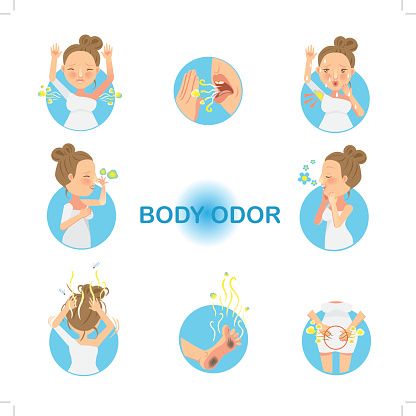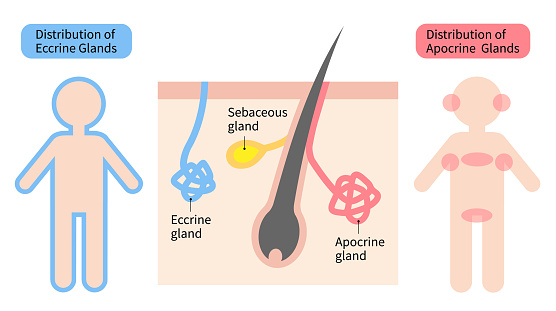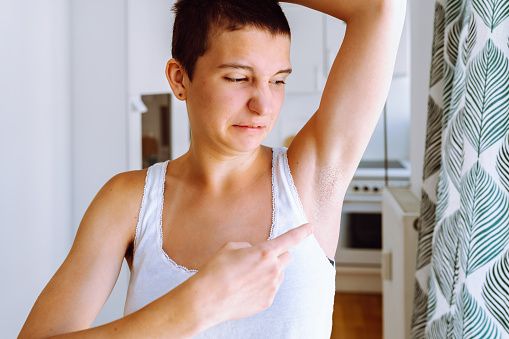DISCLOSURE: This article may contain affiliate links, meaning we get commission if you decide to make a purchase through the links, at no cost to you. Please read the disclosure for more information.
Body Odor
Body odor (BO) is an issue we have all had to deal with. It can be a very isolating subject. Some people may be more sensitive to their own odor that others don’t even notice. Remember, we are all human. We have all had, or currently have that lovely BO! Body odor often changes during hormonal changes in our lives such as appearing during puberty and increasing during menopause. It may be a sensitive subject for some, but it is a subject that deserves to be addressed and discussed.
What are the causes of offensive body odor? For the most part, it is caused by our sweat mixing with bacteria on our skin. The bacteria on our body breaks down, or eats, the sweat. The odor comes from that process. Just like when we “break down”, or eat, our food there is a not-so-rosy-smelling product that comes out of us too! There are also a lot of other issues that may be at play. These may include:
- Hygiene
- Hormonal Changes
- Hair
- Infections
- Body fluids such as urine and stool
- Foods you consume
- Oral Health
- Diseases and genetic disorders

Hygiene and Body Odor
Foul-smelling body odor is called Bromhidrosis. It is often a result of hygiene practices. This can be as simple as not knowing how or what to clean or how often. Some people can shower daily, others every few days, but if you or others are noticing an odor it may be time to shower more often than your regular routine.
When bathing you need to address every part of your body from your head to your toes. This includes, but is not limited to, behind and around your ears, neck, underarms, in between your fingers and toes, the crevices of your anus and genital regions, behind joints, your belly button and in the folds of your skin.
This may seem odd to have to say but I have met many people that didn’t understand certain parts of their body had to be cleaned. I knew a very intelligent, young woman whose odor came from her feet. Throughout her life, her caregivers had not taught her to clean her feet. She was top of her class, very active, and well-groomed otherwise. Her odor cleared up after she started scrubbing her feet!
I knew another person who was told by their spouse that they smelled like feces. It turned out the odor was from a fungal infection inside their belly button! This was an older individual who was not able to smell as well and cleansed themselves otherwise. This person was also a highly educated professional. Hopefully, you are getting my drift here-that odors happen to everyone.
There have been changing recommendations over the years on how often and with what to wash. If you are in a cooler climate and not sweating, bathing every few days may work for you. But if you are in a warmer climate, work in a dustier area, exercise frequently or sweat a lot, you will definitely need to bathe more often. This may be even more than once a day!
Using a washcloth or other assistance, more than just your hand, with your soap does get you cleaner and helps clean off a layer of dead skin cells, even on your face.
You may have more sensitive skin, or other issues, where you need to use less abrasive material on your face or other areas but, typically, try to use an applicator for your soap other than just your hand. It is also helpful to set up a regular exfoliating routine. This can be weekly if needed. Exfoliating is basically using a rougher soap applicator than your regular washcloth. You can easily find these as exfoliating gloves or cloths in the body wash section of your local pharmacy or department store.
And remember, these need cleaned too! Throw them in your wash with a little bleach to kill any accumulated fungi or bacteria.
Hormonal Changes can lead to body odor
Puberty is the time from a tween to a teen that the changing body comes with a changing smell as well. Just walk into any high school gym and you won’t be able to miss it!. During the tween period, hormones begin to change and that change increases the production of the sweat glands.
There are 2 types of sweat glands: eccrine and apocrine. Eccrine glands are all over the body and do not always produce odor, though they can as you will see later. Apocrine glands are concentrated in our armpits and groin and they become stimulated by puberty hormones. They begin to release pheromones during puberty that are a smell to attract a mate. They are also the glands with hair follicles-hence the growth of pubic and armpit hairs.
The sweat from these glands mixes with our normal skin bacteria to start producing the odor you will now need to start wearing deodorant for! This is a normal process and nothing to worry about. But this is also why you don’t need deodorant until this point in your life.

Another change comes with biological women—menopause. Menopause is the beginning of the end of periods and fertility. When this starts to happen the estrogen levels begin to drop which causes the body to not regulate temperature properly leading to hot flashes and sweating.
Remember, it is sweat mixing with the bacteria on our skin that is the common culprit of bad body odor. So it is the increased sensation of body heat and sweat that may increase the menopausal person’s body odor. There are many medications and supplements that can help with the hormonal changes and hence the body odor. These include Effexor, black cohosh, hormone replacement therapy, primrose oil and others. You can also try to stay cool and dry and switch up your hygiene routine-just as you had to during puberty.
A new cleansing and deodorant product, Lume, that works more as an acid wash works well for body odor due to hormonal changes, such as puberty and menopause. I must say it doesn’t have the best odor, but once it is applied and mixes with your body that all changes (hopefully)!
Can your hair cause body odor?
Yes, your hair may be the source of the odor, no matter where on your body! While this would technically be listed under poor hygiene or infections, it is a common enough source that is often overlooked and deserves its own space. Your scalp and facial hair need regular cleansing.
There is a multitude of products to choose from. Certain types of hair are often kept treated in a way that they are not washed as frequently. And this is perfectly ok. Remember it is still treated and maintained just not necessarily washed. Here again, the amount of cleansing it will need varies per person.
Your environment, type of hair and products used are just some factors determining how often to cleanse. But, no matter what, if you or someone else notices an unpleasant odor…..you need to address and change up your routine. Give your locks some love!
Dandruff caused by fungus may also develop an odor just as it does on feet. This can sometimes get into the beard, mustache or eyebrows. You may notice redness and flaking. You may also notice a salmon-colored rash on the back of the neck below the hairline. Different fungi can present differently.
Many over-the-counter products are available that may help alleviate this issue. Selsun blue medicated shampoo is quite effective for some of these fungi. You would use it at the beginning of the shower and then rinse it off over your entire body at the end of the shower. You can do this daily for a week or two and then move on to a once to twice weekly maintenance schedule. Nizoral anti-fungal shampoo 1% is now over the counter as well. The prescription strength is 2% but the 1% should work just fine. Tar shampoos have also been shown to alleviate some of these issues.
If over-the-counter or prescription topical solutions are not effective, or it returns after treatment, you may need an oral medication. Oral antifungal medications may cause liver damage and other side effects. So this needs to be watched with regular blood work. You should definitely talk to your doctor about this.
Infections as the body odor culprit
There are 3 main types of microbes that live on our bodies: viruses, bacteria and fungi. There are approximately 39 TRILLION of these microbes crawling on you right now. That means they outnumber our own cells 10 to 1! We do have some oral antiviral medications that fight some viruses. Covid, flu, herpes and chickenpox are all examples of viruses. Bacteria are cellular organisms. Antibiotics are used to kill bacteria. Strep and E.coli are examples of bacteria. Fungi are a different type of organism that is killed by antifungal medications. Candida causing vaginal yeast infections is an example of a fungus.
We need some of these organisms on our skin. They work as a barrier and protect us. This is why it may be better to not use antibacterial or antimicrobial hygiene products. Studies have shown that they kill the good organisms and allow the bad ones we don’t want to grow to now overgrow and colonize our bodies.
This has happened with Methicillin-resistant Staph aureus (MRSA), a potent type of staph bacteria. A large part of our population has become colonized with MRSA. When someone colonized with MRSA gets a scratch or injury this bad bacteria can take over and create an even worse infection. Ordinarily, the good organisms that live on our body would aid in the healing process, but not if we have killed those good bacteria off by regularly using antibacterial soaps and products.
Other Fungal infections
As we have already discussed, fungus may also cause infections and hence odors. Athlete’s foot and jock itch are some well-known types of this that you may recognize. Fungi can affect other areas of your body too. Increased weight can cause rolls in the skin that leave moist areas where the fungus will flourish. This is common around the abdomen, underarms and inner thighs. This can be quite itchy and emit an odor, especially when the skin fold is lifted exposing the infection underneath.
There are many over-the-counter antifungal creams available to treat these conditions that usually work well. Sometimes, you may need an oral or a topical prescription. Remember, fungus likes moist, dark areas. Think of the mushrooms you see in the forest. So simply cleansing and keeping these areas on your body dry will help avoid and resolve these abundant sources of body odor! Weight loss will also help.
Other Organisms
In addition to viruses, bacteria and fungi, there are two other types of microbes in our environment that can infect us. One is prions which are not really “alive”. An example of a prion is mad cow disease. The other is protozoa which are uni and multicellular organisms. An example of protozoa is trichomoniasis which is a sexually transmitted disease. Trichomoniasis causes an infection of the vaginal area and leads to a very noticeable fishy odor.
As you can see, many infections on our skin, no matter the source, can emit odor. Sometimes that odor can be very difficult to be around. If you cleanse regularly and do not use antibacterial products on a regular basis this should help to prevent these infections. Though once you have this odor, you can begin using antibacterial soaps to try to eradicate the bacteria causing it. If you do develop any tender, red or oozing areas, or anything of odor or concern, please see your doctor.
Body fluids leading to body odor
Leakage of urine or stool may be a cause of the unwanted odor. Incontinence is a disease where you may urinate on yourself. This may be little trickles with coughing or laughing. Or it may be a lot more. The incidence of incontinence increases with age, certain health conditions or surgeries and with increased weight. It can happen to any gender.
In addition, certain medical conditions increase your risk of stool leakage from your rectum, or anus. Urine and stool may also collect on your pelvic area when you are unable to wipe well after going to the restroom due to physical limitations. Some people with these issues may wear adult diapers. This does usually help confine any odor that is emitted. If you can tackle the cause of your body fluids leaking, this may be a better solution. Just having the urine or feces collecting on your pelvic area increases your risk of infections, further increasing the odor that may be emitted. If you have these issues definitely talk to your doctor.
Foods
Yes, you read that correctly! There are different ways that foods cause body odor. One example is a gene, that some people have, which causes them to emit foul-odored urine when they eat asparagus. Another example is certain foods such as spicy foods, caffeine, and alcohol can increase sweat production. While sweat doesn’t have an odor by itself it mixes with the bacteria on your skin and that can make an odor when the bacteria break down the sweat.
Other foods, such as onion, cabbages, red meat and garlic, can emit an odor through your sweat all on their own. This is where the eccrine glands, which are all over your body, come into play. The sweat from these glands can emit the smell of foods you eat. So simply keeping yourself dry may help with this issue. Of course, avoiding the causative foods can be a good start to clearing up any odor they may be causing!

Oral health
Dental hygiene is very important. There are many causes of odor from the mouth. Some may simply be hygiene. You may need to brush your teeth and tongue. Doing this at least twice a day is best in combination with flossing. There are currently conflicting studies on the uses of different mouth rinses. Please refer to your dentist on what they recommend.
Recent studies have shown higher pH rinses, such as ACT, are better for your oral health. It is thought that the lower pH ( more acidic) and more alcohol-concentrated rinses dry the mouth out too much and kill too many good bacteria leading to bad breath.
So, here again, infections are a huge culprit. Bacteria causes infections of the gums and teeth. Bacteria cause dental decay. Bad teeth cause a lot of odor. So keeping up on your twice-yearly dental care can help prevent this!
When dry mouth is causing an odor, chewing gum or candies and staying hydrated may help. Chewing helps to increase saline production and keep the mouth moist. Certain medications have a side effect of dry mouth that you need to discuss with your doctor if it becomes a problem. Ironically, urinary incontinence medications may cause dry mouth. So you cure your odor from urine leakage but cause an odor from your mouth due to the medication! There are pros and cons to everything. You just have to weigh what is best for you.
In addition, certain foods such as fish, onions, and coffee are easily remedied sources of odor. Just brush your teeth and tongue after consumption!
Your body odor can be a sign of disease!
Certain diseases such as diabetes, kidney disease, liver disease and some genetic disorders can also be a source of body odor. You would need to work with your doctor to detect and treat these.
What can I do now for my body odor?
- First look for the source and address it.
- Always stay clean and dry. Drying right after you shower is very important.
- Keep your hair short or shaved in your armpits and where you can.
- Wear clean clothes daily and after you have been sweating.
- Keep your mouth and teeth healthy by brushing, flossing and seeing your dentist.
- Try to decrease your sweat.
- If you have an odor that is due to your body/sweat, you can try using antibacterial soaps/cleansers.
- When all else fails there are invasive treatments you can discuss with your doctor:
I. Botox to deactivate the muscles of the sweat glands.
II. Surgery to remove the glands.
III. Liposuction may help remove the fat that creates an environment for sweat and odor.
To conclude
As we age we start to lose our sense of smell. This is why your grandparent may not know they need to shower, have an infection somewhere, or are leaking stool. So letting someone know they smell is the kind thing to do. Now that you know some of the serious causes of body odor, you just may save someone’s life!
In some instances, body odor is nature’s way of alerting us. So, in summary, if you or someone you know smells, look for the cause and address it. That may simply be wearing clean clothes and showering. It also may mean something more serious needs attention. Working with your doctor will help aid you in finding the source. If you haven’t seen your doctor already about this issue please do not wait especially if you have any of the following:
- Fruity or bleach-like odor
- Sudden change in odor
- Excessive sweating especially when not exercising and when it’s not hot
- Night sweats
- Frequent infections
These can be indicative of other health issues, such as diabetes.
NIH Humane Microbiome Project defines normal bacterial makeup of the body 13 June 2012, National Institue of Health website, US government, accessed July 2022
Health Library 4 March 2022, Cleveland Clinic website, Cleveland Clinic, accessed July 2022
Bromhidrosis 18 September 2018, Healthline website, James Roland/Suzanne Falk, M.D., accessed August 2022
